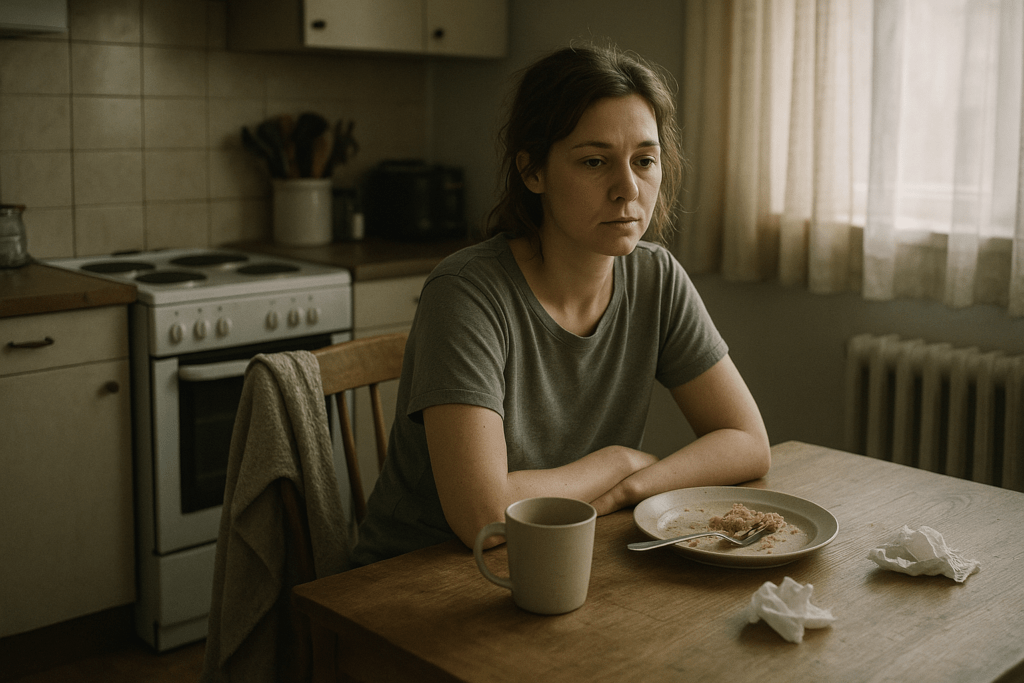
Introduction
Wellness isn’t always green smoothies and perfect sleep cycles. Sometimes, it’s dragging yourself out of bed, drinking a glass of water, and calling that a win. And that’s okay.
There’s a version of health that doesn’t get talked about because it’s not aesthetic. It’s not polished. It’s not sponsored by a supplement brand. But it’s real. And if you’re in survival mode, it’s probably the only version that matters right now.
The Wellness Lie: Performance Framed as Self-Care
We used to write about balance. About discipline. About setting goals, optimizing routines, and stacking habits for long-term growth. That version of health made sense when life was stable—when you had the bandwidth to dream, push, and track.
But then things broke. Sometimes slowly. Sometimes all at once.
The world didn’t care about your planner. Life hit hard, and survival became the only priority. And suddenly, everything that felt like progress now felt like pressure.
Too often, wellness is sold as a lifestyle goal—something that looks good on camera and earns likes. Wake up at 5 AM. Meditate. Cold plunge. Macro-count. Lift heavy. Journal gratitude. Repeat.
But that model only works if your nervous system isn’t already fried.
If you’re barely hanging on, that kind of routine is overwhelming. It creates guilt instead of growth. Shame instead of structure. And it silently tells you that unless you’re thriving, you’re failing.
Truth is, survival is health when you’re burned out. Functioning is enough.
The Reality of Survival Mode
Survival mode means your baseline isn’t optimized. It’s diminished. Your focus, your willpower, your mood—they’re all running on fumes.
It means:
- Your meals are basic, not balanced
- Your sleep is fragmented
- Your exercise is standing up every few hours
- Your win for the day is brushing your teeth or drinking water
It also means:
- You skip showers not out of laziness, but because you don’t have the mental bandwidth
- You microwave leftovers and call it a meal
- You go silent in group chats, not because you don’t care, but because replying takes too much effort
Sometimes it looks like sitting in one spot for hours because moving feels like too much. Sometimes it’s deciding between making food or just staying hungry for another hour. It’s not a lack of discipline. It’s a system overload.
Your nervous system doesn’t recognize intention when it’s overwhelmed. It only reads safety signals—or the lack of them. That’s why even basic routines fall apart. The body’s on high alert, and even the smallest task feels like climbing a mountain.
And that’s not failure. That’s resilience in its rawest form.
Reframing Health in Hard Times
You don’t need to optimize. You need to stabilize. And that means redefining health not by the outcome, but by the intent.
If you chose water over soda? That’s health.
If you took a five-minute walk instead of scrolling? That’s health.
If you didn’t numb yourself with junk food today? That’s health.
Even when you wake up exhausted and barely move through the day, showing up at all counts. You’re alive. You’re trying. That’s enough.
Survival isn’t glamorous. It’s not trending on fitness reels. But it’s how you hold your ground until the fog lifts. It’s how you protect your mind and body until you have the capacity to heal.
We don’t discard the old ideals. We hold onto them as reminders of what life looked like before the crash. But we don’t force ourselves to live like we’re still there. We adapt. That’s the Healthy Forge mindset. That’s what CAS is: not denial of the past—but full presence in the now.
We’re not rejecting growth—we’re delaying it until we have the strength to carry it. Until then, staying functional is enough. You don’t need transformation. You need traction.
The Quiet Habits That Actually Keep You Alive
Forget the glamorized routines. The habits that matter in survival mode are the boring, grounding ones:
- Drink a glass of water first thing
- Eat something with protein, even if it’s not perfect
- Go outside, even if it’s just for 60 seconds
- Talk to one real human
- Sleep at a consistent time, even if the quality sucks
Each of these things seems small. But when you’re depleted, they create micro-stability. They’re not “healthy habits”—they’re life-preserving anchors. They interrupt the spiral. They remind your body it’s still safe, even when your brain says otherwise.
Even one of these actions—done inconsistently, messily, imperfectly—can start to carve out space between you and the collapse.
And if you only manage one thing today? Let that be enough. Because on your worst day, consistency means nothing. Survival means everything.
Final Thought: You’re Not Falling Behind—You’re Still Here
Health doesn’t always look strong. Sometimes it looks like survival. Sometimes it looks like dragging yourself through the day and doing it again tomorrow.
We’re not here to glorify struggle. But we are here to acknowledge it. To say: if you’re still showing up in your own way, you’re not behind. You’re human. You’re adapting.
The world might never return to what it was. And honestly? Maybe we don’t need it to. Maybe survival-first health is the kind that makes us finally honest about what life actually looks like outside of the highlight reel.
In this season, survival is health. Hold the line.
